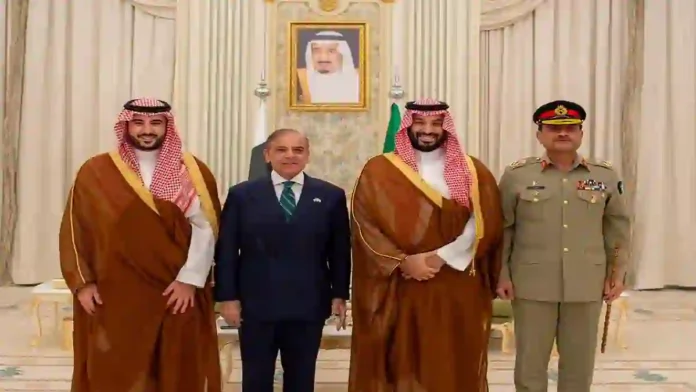Pakistan’s Defence Minister Khawaja Mohammad Asif has openly stated that his country’s nuclear capabilities could be extended to Saudi Arabia if required under the newly signed Pakistan–Saudi Arabia defence pact.
This marks the first explicit acknowledgment that Islamabad is willing to bring Riyadh under a nuclear security umbrella, a move that significantly alters the balance of power in the Middle East. The pact, signed on Wednesday, declares that an attack on one nation will be treated as an attack on both, effectively formalizing a collective defence arrangement with nuclear implications.
Read- Pakistan Says Its Nuclear Program Can Be Made Available To Saudi Arabia Under Defence Pact
Asif’s remarks to Geo TV highlighted Islamabad’s readiness, noting that Pakistan’s nuclear deterrent has existed since its 1998 tests, with trained forces prepared for deployment. While details of operational sharing were not disclosed, the minister’s assurance suggested more than symbolic backing. Saudi Arabia, which has long been suspected of seeking access to a nuclear hedge through Pakistan, now finds itself linked to Islamabad’s arsenal in a more direct framework.
The development follows heightened regional volatility after Israel’s airstrike in Qatar that killed senior Hamas leaders, raising Gulf states’ fears of being targeted in wider regional escalation. By declaring its willingness to extend nuclear protection, Pakistan positions itself as Riyadh’s strategic guarantor against threats, including Israel, which is regarded as the only nuclear power in the Middle East. This is a significant geopolitical signal, given Israel’s longstanding policy of ambiguity on its atomic arsenal.
Saudi Arabia’s historic financial support for Pakistan’s nuclear program provides essential context. Analysts, including retired Brig. Gen. Feroz Hassan Khan, have long argued that Riyadh bankrolled Pakistan’s atomic efforts during years of U.S. sanctions, creating an implicit quid pro quo. With this defense pact, that implicit understanding appears to have become explicit, introducing the possibility of nuclear security transfer or at least nuclear deterrent assurance on behalf of the Kingdom.
Read- In Another Blow To India, US Revokes Sanctions Waiver On Iran’s Chabahar Port
Read- Will Saudi Arabia Attack India If India Strikes Pakistan Again
The pact also carries implications for South Asia. Pakistan developed its nuclear weapons as a deterrent against India, which currently holds 172 warheads compared to Islamabad’s 170, according to the Bulletin of Atomic Scientists.
Extending the scope of its arsenal beyond South Asia to the Middle East risks sharpening India’s security calculus and potentially complicating its relations with Gulf partners. It may also draw global concern amid existing proliferation anxieties, especially given Pakistan’s past proliferation controversies involving the A.Q. Khan network.
Internationally, the revelation could strain U.S. and Western relations with both Pakistan and Saudi Arabia. Washington has long been wary of nuclear proliferation in the region, and reminders of Pakistan’s ballistic missile sanctions remain fresh.
If Riyadh is now explicitly placed under Pakistan’s nuclear protection, pressure could mount for new sanctions or diplomatic countermeasures to prevent a precedent that undermines the global non-proliferation regime.
At the same time, this development solidifies a strategic convergence: Saudi Arabia gains a nuclear umbrella against Israel and Iran without formally developing its own arsenal, while Pakistan gains renewed economic and political leverage with its Gulf ally. The announcement therefore represents not only a nuclear security assurance but also a recalibration of Middle Eastern power alignments at a volatile time.
Based On AP Report
Agencies




